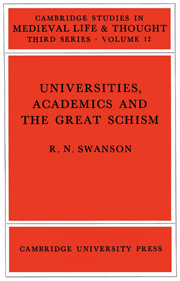Book contents
- Frontmatter
- Contents
- Maps
- Preface
- Abbreviations
- 1 The rival obediences, 1378–1409
- 2 The rival obediences, 1409–1418
- 3 The universities of Europe, 1378–1418
- Introduction
- 1 THE CONTEXT
- 2 A MATTER OF LOYALTY
- 3 DE SCHISMATE EXTINGUENDO
- 4 A BREATHING SPACE
- 5 DE SUBTRACTIONE OBEDIENTIE I
- 6 DE SUBTRACTIONE OBEDIENTIE II
- 7 DE RESTITUTIONE OBEDIENTIE
- 8 DE MATERIA CONCILII GENERALIS
- 9 HAEC SANCTA SYNODUS …
- 10 CONCLUSION
- APPENDIX 1 Notes on some academic personalities
- APPENDIX 2 University foundations, 1378–1418
- Notes on manuscripts cited
- Bibliography of works cited
- Index
6 - DE SUBTRACTIONE OBEDIENTIE II
Published online by Cambridge University Press: 27 October 2009
- Frontmatter
- Contents
- Maps
- Preface
- Abbreviations
- 1 The rival obediences, 1378–1409
- 2 The rival obediences, 1409–1418
- 3 The universities of Europe, 1378–1418
- Introduction
- 1 THE CONTEXT
- 2 A MATTER OF LOYALTY
- 3 DE SCHISMATE EXTINGUENDO
- 4 A BREATHING SPACE
- 5 DE SUBTRACTIONE OBEDIENTIE I
- 6 DE SUBTRACTIONE OBEDIENTIE II
- 7 DE RESTITUTIONE OBEDIENTIE
- 8 DE MATERIA CONCILII GENERALIS
- 9 HAEC SANCTA SYNODUS …
- 10 CONCLUSION
- APPENDIX 1 Notes on some academic personalities
- APPENDIX 2 University foundations, 1378–1418
- Notes on manuscripts cited
- Bibliography of works cited
- Index
Summary
The rejection by the University of Oxford of the Parisian proposals regarding the via cessionis had been received at a critical stage of the debates within France itself. Preparations had been in hand since April 1396 for the second national council of the French church, although the assembly did not actually begin until August. The official Parisian line, revealed by Pierre Plaoul in his speech of 29 August, had by then hardened into a demand for total subtraction of obedience from Benedict XIII. But the Parisians were divided, with Pierre d'Ailly appearing as a supporter of a council of the obedience. The conflict with the University of Toulouse appeared again during the proceedings of the council, with Sancho Mulier and Pierre Ravat appearing among Benedict's defenders against the attacks of the Parisians.
The outcome of this council was a reaffirmation of the policy of subtraction of obedience, although its implementation was to be delayed until Benedict had been given another chance to accept the via cessionis. The Parisian masters were naturally disappointed at this result, but the university's policy was encountering considerable national and international opposition: even Castile issued a formal rejection of cession early in 1397. There was also dissension within the university itself, those involved including Jean Gerson. His tract, De schismate, vel de papatu contendentibus incorporated a spirited rejection of most of the university's proposals in favour of Benedict's own suggestion of the via discussionis.
- Type
- Chapter
- Information
- Universities, Academics and the Great Schism , pp. 114 - 134Publisher: Cambridge University PressPrint publication year: 1979

